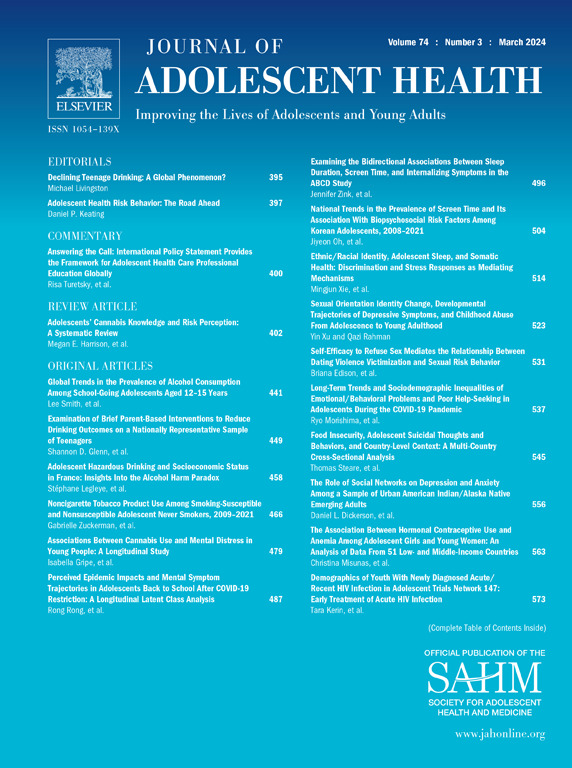按种族和民族划分的性少数和性别少数青年的心理健康和护理利用情况。
IF 5.5
2区 医学
Q1 PEDIATRICS
引用次数: 0
摘要
目的:现有文献对性少数和性别少数青少年(SGMA)的种族和族裔亚群体在心理健康和心理保健利用方面的差异提供了有限和不一致的发现。本研究旨在调查SGMA心理健康和护理利用的种族和民族差异。方法:对参与2022年全国女同性恋、男同性恋、双性恋、跨性别和酷儿青少年调查(N = 9,691)的SGMA大样本数据进行分析。使用患者健康问卷-4评估抑郁和焦虑症状。心理卫生保健利用情况分类如下:(1)接受;(2)希望但未得到(表明未满足的精神卫生保健需求);(3)既不希望也不得到。结果:与白人SGMA相比,黑人/非裔美国SGMA报告焦虑症状的可能性较小(调整患病率比= 0.89,95%置信区间[ci] = 0.82-0.97)。在SGMA中没有观察到明显的抑郁症状的种族和民族差异。在精神卫生保健利用方面,亚裔或亚裔美国人(校正相对风险比[ARRR] = 2.07, 95% ci = 1.62-2.64)、黑人/非裔美国人(ARRR = 1.80, 95% ci = 1.41-2.28)和西班牙裔/拉丁裔SGMA (ARRR = 1.32, 95% ci = 1.16-1.51)比白人SGMA更容易报告未满足的精神卫生保健需求。讨论:尽管在我们的样本中没有记录焦虑和抑郁症状的主要和一致的种族和民族差异,但亚裔或亚裔美国人、黑人/非裔美国人和西班牙裔/拉丁裔SGMA比白人更有可能报告未满足的精神卫生保健需求。这一发现强调需要解决种族和少数民族SGMA的精神卫生保健障碍。本文章由计算机程序翻译,如有差异,请以英文原文为准。
Mental Health and Care Utilization Among Sexual and Gender Minority Youth by Race and Ethnicity
Purpose
Existing literature has provided limited and inconsistent findings regarding disparities in mental health and mental health care utilization among racial and ethnic subgroups of sexual and gender minority adolescents (SGMA). This study aimed to investigate racial and ethnic disparities in mental health and care utilization among SGMA.
Methods
Data from a large national sample of SGMA who participated in the 2022 Lesbian, Gay, Bisexual, Transgender and Queer National Teen Survey (N = 9,691) were analyzed. Symptoms of depression and anxiety were assessed using the patient health questionnaire-4. Mental health care utilization was classified as follow: (1) received; (2) wished for but not received (indicating unmet mental health care needs); and (3) neither wished for nor received.
Results
Compared to White SGMA, Black/African American SGMA were less likely to report anxiety symptoms (adjusted prevalence ratio = 0.89, 95% confidence intervals [CIs] = 0.82–0.97). No significant racial and ethnic differences in depression symptoms were observed among SGMA. Regarding mental health care utilization, Asian or Asian American (adjusted relative risk ratio [ARRR] = 2.07, 95% CIs = 1.62–2.64), Black/African American (ARRR = 1.80, 95% CIs = 1.41–2.28), and Hispanic/Latino SGMA (ARRR = 1.32, 95% CIs = 1.16–1.51) were more likely to report unmet mental health care needs than White SGMA.
Discussion
Despite the lack of major and consistent racial and ethnic differences in anxiety and depression symptoms documented in our sample, Asian or Asian American, Black/African American, and Hispanic/Latino SGMA were more likely to report unmet mental health care needs than their White counterparts. This finding highlights the need to address barriers to mental health care for racially and ethnically minoritized SGMA.
求助全文
通过发布文献求助,成功后即可免费获取论文全文。
去求助
来源期刊

Journal of Adolescent Health
医学-公共卫生、环境卫生与职业卫生
CiteScore
10.40
自引率
3.90%
发文量
526
审稿时长
46 days
期刊介绍:
The Journal of Adolescent Health is a scientific publication dedicated to enhancing the health and well-being of adolescents and young adults. Our Journal covers a broad range of research topics, spanning from the basic biological and behavioral sciences to public health and policy. We welcome a variety of contributions, including original research papers, concise reports, literature reviews, clinical case reports, opinion pieces, and letters to the editor. We encourage professionals from diverse disciplines such as Anthropology, Education, Ethics, Global Health, Health Services Research, Law, Medicine, Mental and Behavioral Health, Nursing, Nutrition, Psychology, Public Health and Policy, Social Work, Sociology, and Youth Development to share their expertise and contribute to our mission of promoting adolescent health. Moreover, we value the voices of young individuals, family and community members, and healthcare professionals, and encourage them to submit poetry, personal narratives, images, and other creative works that provide unique insights into the experiences of adolescents and young adults. By combining scientific peer-reviewed research with creative expressions, our Journal aims to create a comprehensive understanding of the challenges and opportunities in adolescent and young adult health.
 求助内容:
求助内容: 应助结果提醒方式:
应助结果提醒方式:


